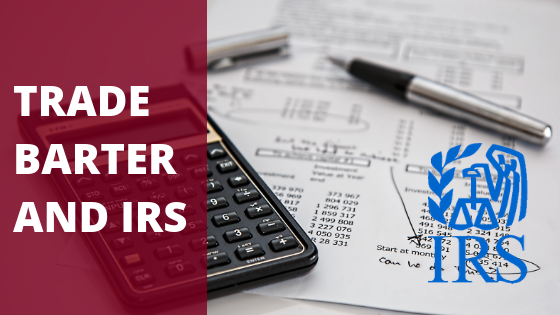
Barter income is taxable to your business (services performed, or products sold) in the year in which it is realized. The income from bartering activity is recorded in the same way as other forms of income on the appropriate tax return for your type of business.
From the IRS website; here are a few facts about bartering:
-
Bartering income.
Both parties must report the fair market value of the product or service they get as income on their tax return.
-
Barter exchanges.
A barter exchange is an organized marketplace where members barter products or services. Some operate out of an office and others over the Internet. All barter exchanges are required to issue Form 1099-B, Proceeds from Broker and Barter Exchange Transactions. Exchanges must give a copy of the form to its members who barter each year. They must also file a copy with the IRS.
-
Trade Dollars.
Exchanges trade barter, or trade dollars as their unit of exchange in most cases. Barter and trade dollars are the same as U.S. currency for tax purposes. If you earn trade and barter dollars, you must report the amount you earn on your tax return.
-
Tax implications.
Bartering is taxable in the year it occurs. The tax rules may vary based on the type of bartering that takes place. Barterers may owe income taxes, self-employment taxes, employment taxes or excise taxes on their bartering income.
-
Reporting rules.
How you report bartering on a tax return varies. If you are in a trade or business, you normally report it on Form 1040, Schedule C, Profit or Loss from Business.
All barter income is on the cash basis. Perhaps the most important barter accounting concept is that the IRS treats barter transactions as income received for both accrual-basis and cash-basis clients. The value of trade dollars received must be included in gross income for the tax year in which they are credited to the client’s account. Since tax is due on this income in the year it accrues, companies that are profitable should avoid having unspent trade dollars at the end of the fiscal year. This is not a concern during unprofitable years. If barter income does not put the company into a profit situation, it will not be taxed. In the event of year-end excess barter credit, a network can arrange tax-deductible, charitable contributions using barter.
Barter transactions, both income and expenses, are considered in the same way as other income and expenses for your business in terms of their effect on your tax liabilities and the amount and types of taxes you must pay.
The expenses related to your barter transactions may be deductible as legitimate business expenses.
Barter exchanges, both online and in person, need to be reported on Form 1099-B unless they occur through a barter exchange with less than 100 transactions during the year, are done with an exempt foreign person (as defined by the IRS), or involve property or services worth less than $1.
As a business owner and member of a trade club, you will receive a 1099-B from the exchange, showing the amount of income you received during the year from bartering your products or services.